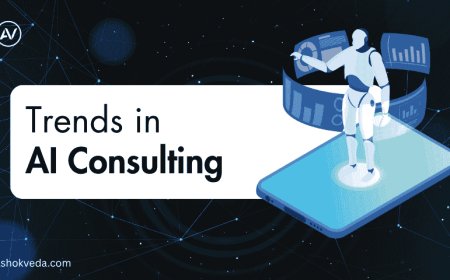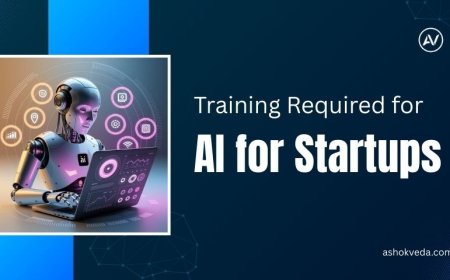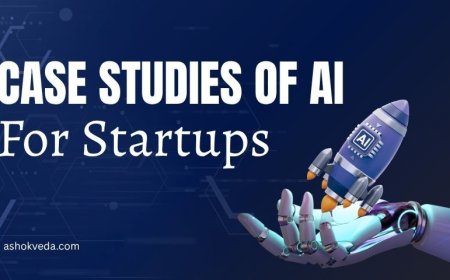The Most Powerful AI Models Used in AI for Startups Today
Explore key AI models powering AI for Startups. Understand how predictive, NLP, automation, and generative models help founders build smarter products.
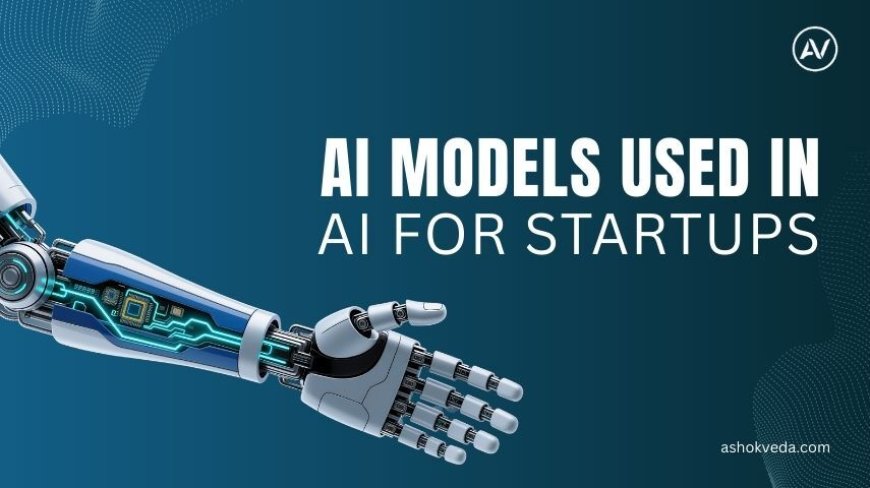
Artificial Intelligence has become one of the biggest competitive advantages for early-stage companies. From automation to customer analytics to product personalization, AI is reshaping how startups grow and operate. But behind every smart product or system lies a specific AI model powering the intelligence. Understanding these models is essential for founders, product teams, and digital innovators who want to leverage AI for Startups effectively. But with so many AI models available, choosing the right one can feel overwhelming. Should a startup begin with automation models, NLP models, or predictive analytics models? How do founders decide what works best for their industry or product?
Why AI Models Matter for Startups
Startups today operate in a highly competitive, data-driven world where speed and innovation determine survival. AI models help these young companies automate tasks, analyze massive datasets, personalize customer experiences, and make smarter decisions. Whether it’s a chatbot responding instantly or a recommendation engine predicting user interests, AI models sit at the center of every intelligent solution.
For companies using AI for Startups, knowing which models to adopt can significantly influence cost, accuracy, scalability, and overall product performance. The right AI model can help a startup launch faster, operate more efficiently, and create better user experiences—while the wrong model can drain financial and technical resources. That’s why gaining a solid understanding of AI models is not just beneficial—it’s strategic.
What Are AI Models?
An AI model is a mathematical or algorithmic system trained using data to perform specific tasks. These tasks can include:
-
Predicting outcomes
-
Understanding text
-
Recognizing images
-
Learning patterns
-
Making decisions
-
Classifying information
AI models learn from data instead of following fixed rules. This learning ability makes them powerful tools in AI for Startups, where real-time insights and fast adaptation matter.
Why Startups Rely on AI Models
AI models offer speed, intelligence, and scalability—three critical advantages for early-stage companies working with limited resources.
Key Reasons Startups Use AI Models
-
They automate time-consuming tasks.
-
They improve customer experience through personalization.
-
They reduce operational costs.
-
They help founders make data-driven decisions.
-
They support faster product development.
-
They provide predictive insights that strengthen growth strategies.
With the right strategy, AI models help startups compete with bigger players despite having smaller teams.
Top AI Models Used in AI for Startups
This section covers the most popular AI models used by modern startups. Each model includes definitions, use cases, and examples to help you understand their relevance.
1. Machine Learning Models
Machine Learning (ML) models learn from data and improve over time without being manually programmed. They are widely used in AI for Startups because they can solve problems related to prediction, classification, and pattern recognition.
Common Machine Learning Models
-
Linear Regression – predicts numerical values like sales or revenue
-
Logistic Regression – classifies outcomes such as “yes/no” or “buy/not buy”
-
Decision Trees – simple but effective models for decision-making
-
Random Forest – combines multiple trees for greater accuracy
-
Support Vector Machines (SVM) – excellent for classification tasks
Startup Use Cases
-
Predicting customer churn
-
Fraud detection in fintech
-
Demand forecasting for e-commerce
-
Pricing optimization for marketplaces
2. Deep Learning Models
Deep Learning models use neural networks to learn complex patterns from large datasets. They are especially useful for image, audio, and text-based tasks.
Key Deep Learning Models
-
Convolutional Neural Networks (CNNs) – used for images and videos
-
Recurrent Neural Networks (RNNs) – used for time-series and sequential data
-
LSTMs and GRUs – handle long sequences like language and stock data
-
Transformers – the latest and most powerful architecture in AI
Startup Use Cases
-
Image recognition in healthtech
-
Autonomous navigation in mobility startups
-
Speech-powered apps
-
Predictive analytics for fintech
-
Personalized content recommendation
Deep learning is one of the fastest-growing parts of AI for Startups, especially in sectors like health, finance, retail, and logistics.
3. Natural Language Processing (NLP) Models
NLP models help machines understand and generate human language. Startups rely heavily on NLP models to automate communication and extract insights from text.
Popular NLP Models
-
BERT
-
RoBERTa
-
GPT-based models
-
T5
-
LLaMA
Startup Use Cases
-
Chatbots and customer support automation
-
Sentiment analysis of reviews
-
AI writing assistants
-
Voice-powered applications
-
Email automation
NLP is essential in AI for Startups where customer interaction plays a major role.
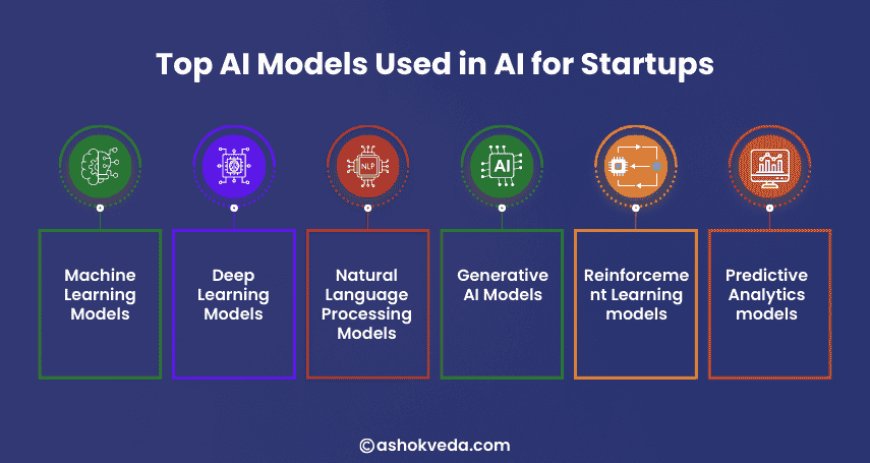
4. Generative AI Models
Generative AI models create new content—including text, images, code, and audio—based on patterns they have learned.
Types of Generative Models
-
VAEs (Variational Autoencoders)
-
Diffusion Models
-
Large Language Models (LLMs)
Startup Use Cases
-
Content generation for marketing
-
Image generation for design
-
Product idea simulation
-
Code generation for development teams
-
Personalized campaign creation
Generative AI has become a major wave in AI for Startups, helping founders save time and innovate faster.
5. Reinforcement Learning Models
Reinforcement Learning (RL) models learn by performing actions and receiving rewards. They are ideal for real-time decision-making and optimization.
Startup Use Cases
-
Recommendation engines
-
Robotics and automation
-
Game-based platforms
-
Financial portfolio management
-
Dynamic pricing algorithms
Reinforcement learning can significantly enhance product intelligence in startups building smart systems.
6. Predictive Analytics and Forecasting Models
These models analyze historical data to predict future outcomes.
Startup Use Cases
-
Revenue forecasting
-
Lead scoring
-
Market demand prediction
-
Inventory planning
-
Risk assessment
Predictive models are essential in AI for Startups because they reduce uncertainty and guide strategic decisions.
How Startups Choose the Right AI Model
Choosing the right model depends on several factors. Using the wrong approach can lead to high costs, poor performance, or product delays.
Factors Influencing Model Selection
-
Type of data available
-
Complexity of the task
-
Accuracy requirements
-
Budget and computational capacity
-
Time to market
-
Scalability needs
A clear understanding of the problem is the first step before selecting any AI model.
Challenges Startups Face When Using AI Models
Even though AI for Startups brings tremendous growth opportunities, implementing AI models comes with challenges.
Common Challenges
-
Limited datasets
-
High computational requirements
-
Need for specialized AI talent
-
Difficulty integrating AI with existing tools
-
Bias in training data
-
Security and privacy concerns
-
High cloud infrastructure cost
However, with careful planning, cloud-based solutions, and continuous monitoring, these challenges can be managed effectively.
Future of AI Models in Startups
The next wave of AI models will be:
-
More efficient
-
More explainable
-
Less expensive to train
-
More specialized for industries
-
Easier to deploy with low-code tools
This evolution will make AI for Startups even more accessible, allowing small teams to build intelligent products quicker and at lower cost.
AI models are the backbone of every AI-powered startup. From machine learning and NLP to deep learning and generative AI, each model has a unique role in solving real-world business problems. Understanding these AI models helps founders and teams build smarter products, automate tasks, and accelerate innovation. With the right approach, using AI for Startups becomes a powerful strategy to compete in today’s rapidly evolving market. Whether you're building a chatbot, launching a recommendation engine, or creating a generative AI tool, choosing the right model can set the foundation for long-term success.

























